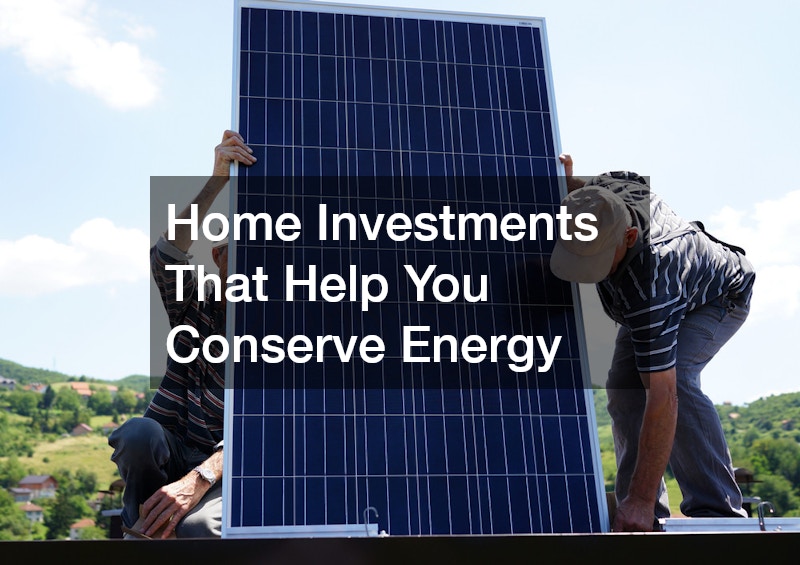
Energy conservation is a growing priority for homeowners who want to reduce their utility bills and minimize their environmental impact. Investing in energy-efficient home improvements can significantly lower energy consumption, making your home more sustainable and cost-effective. This comprehensive guide explores various home investments that can help you conserve energy, including upgrades to your HVAC system, solar installations, and appliance repairs.
HVAC System Upgrades
Heating, ventilation, and air conditioning (HVAC) systems are major contributors to a home’s energy consumption. Investing in energy-efficient HVAC services can significantly reduce your energy usage and improve indoor comfort.
Regular HVAC Maintenance
Routine maintenance is essential to ensure your HVAC system operates efficiently. Scheduling regular air conditioning service and furnace repairs can prevent issues that lead to increased energy consumption. Regular maintenance includes cleaning or replacing filters, checking refrigerant levels, and inspecting ductwork for leaks.
An experienced HVAC technician can also calibrate your thermostat, ensuring your system operates at peak efficiency. Regular maintenance not only conserves energy but also extends the lifespan of your HVAC equipment, reducing the need for costly replacements.
Upgrading to Energy-Efficient Models
If your HVAC system is outdated, consider upgrading to energy-efficient models. Modern HVAC systems use advanced technologies to provide better temperature control while consuming less energy. Look for systems with high Seasonal Energy Efficiency Ratio (SEER) ratings for air conditioners and high Annual Fuel Utilization Efficiency (AFUE) ratings for furnaces.
Investing in programmable thermostats can further enhance energy savings. These devices allow you to set temperature schedules, ensuring your HVAC system operates only when needed. Smart thermostats can learn your preferences and adjust settings automatically, optimizing energy use throughout the day.
Solar Energy Solutions

Harnessing solar energy is an excellent way to reduce reliance on non-renewable energy sources and lower utility bills. Solar panel installations and solar roof companies offer various options to incorporate solar energy into your home.
Solar Panel Installations
Installing solar panels on your roof can generate clean, renewable energy to power your home. Solar panels convert sunlight into electricity, reducing your dependence on the grid. The energy produced can be used to power your appliances, lights, and HVAC system.
Many homeowners opt for grid-tied solar systems, which allow them to sell excess electricity back to the utility company. This arrangement can result in credits on your utility bill, further lowering energy costs. Solar panel installations can be a significant upfront investment, but federal and state incentives, as well as long-term energy savings, make it a worthwhile endeavor.
Solar Roofs
A solar roof integrates solar energy collection directly into the roofing materials. Companies like Tesla offer solar roof tiles that look like traditional roofing materials but function as solar panels. Solar roofs provide the same benefits as traditional solar panels while maintaining the aesthetic appeal of your home.
Working with a reputable solar roof company ensures proper installation and maximizes energy production. Solar roofs are durable and weather-resistant, providing both energy efficiency and protection for your home.
Insulation and Weatherproofing

Proper insulation and weatherproofing are crucial for maintaining a consistent indoor temperature and reducing energy consumption. These investments help keep your home warm in the winter and cool in the summer, reducing the workload on your HVAC system.
Insulation Upgrades
Insulating your home effectively can significantly reduce energy loss. Key areas to insulate include the attic, walls, floors, and basement. High-quality insulation materials, such as spray foam, fiberglass, and cellulose, can improve thermal resistance and prevent heat transfer.
Weatherproofing Windows and Doors
Weatherproofing your windows and doors prevents drafts and air leaks, which can lead to significant energy loss. Installing weatherstripping around door frames and caulking window seams can seal gaps and keep conditioned air inside.
Double-pane or triple-pane windows with low-emissivity (Low-E) coatings can also enhance energy efficiency. These windows reduce heat transfer and block UV rays, helping to maintain a comfortable indoor temperature year-round.
Garage Door Installations
Your garage can be a significant source of energy loss, especially if it is attached to your home. Modern garage door installations include insulated doors that help maintain a consistent temperature inside the garage. This insulation reduces the amount of heat or cold air entering your home, easing the burden on your HVAC system.
Consider upgrading to a high-efficiency garage door with proper sealing and insulation. These doors not only conserve energy but also provide better security and durability.
Efficient Appliances and Repairs
Investing in energy-efficient appliances and ensuring they are well-maintained can lead to substantial energy savings. Regular repairs and timely replacements keep appliances running efficiently.
Energy-Efficient Appliances
When purchasing new appliances, look for ENERGY STAR-certified models. These appliances meet stringent energy efficiency guidelines set by the U.S. Environmental Protection Agency (EPA) and the Department of Energy. ENERGY STAR appliances, including refrigerators, washers, dryers, and dishwashers, consume less energy and water, reducing utility bills.
Washer Repair Service
A malfunctioning washer can waste water and energy. Scheduling a washer repair service can address issues like leaks, inefficient cycles, and faulty components. Regular maintenance and prompt repairs ensure your washer operates efficiently, conserving water and energy.
Appliance Repair Contractors
Appliance repair contractors can diagnose and fix issues with your household appliances, preventing energy waste. Whether it’s your refrigerator, oven, or HVAC system, timely repairs can restore efficiency and extend the lifespan of your appliances. Regular check-ups and servicing can prevent small problems from becoming major energy drains.
Lighting Solutions
Upgrading your lighting to energy-efficient options can significantly reduce electricity consumption. Modern lighting technologies offer improved brightness and longevity while consuming less energy.
LED Lighting
LED (light-emitting diode) bulbs are highly energy-efficient and have a longer lifespan compared to traditional incandescent bulbs. They use up to 80% less energy and can last up to 25 times longer. LEDs are available in various color temperatures and brightness levels, making them suitable for any room in your home.
Smart Lighting Systems
Smart lighting systems allow you to control your lights remotely using a smartphone app or voice commands. These systems can be programmed to turn lights on and off at specific times, dim or brighten based on activity, and even change colors. Smart lighting reduces energy waste by ensuring lights are only used when needed.
Water Heating Solutions
Water heating is a significant contributor to energy consumption in homes. Investing in energy-efficient water heating solutions can lead to substantial savings.
Tankless Water Heaters
Tankless water heaters, also known as on-demand water heaters, provide hot water only when needed, eliminating the energy losses associated with traditional storage tank water heaters. These units are more energy-efficient and can supply a continuous flow of hot water.
Solar Water Heaters
Solar water heaters use solar energy to heat water, reducing reliance on traditional energy sources. These systems can be used in conjunction with existing water heaters, providing hot water even on cloudy days. Solar water heaters can significantly lower water heating costs and are an excellent investment for energy conservation.
Insulating Water Heaters and Pipes
Insulating your water heater and hot water pipes can reduce heat loss and improve efficiency. Insulation blankets for water heaters and pipe insulation sleeves are affordable and easy to install. These measures help maintain water temperature and reduce the energy required to reheat water.
Renewable Energy Systems

Investing in renewable energy systems can further reduce your carbon footprint and lower energy costs. These systems harness natural resources to generate clean energy for your home.
Wind Turbines
For homeowners in windy areas, small wind turbines can generate electricity to supplement your energy needs. Wind turbines convert kinetic energy from the wind into electrical energy, providing a renewable energy source. Proper siting and installation are crucial to maximize efficiency and energy production.
Geothermal Systems
Geothermal heating and cooling systems use the earth’s stable underground temperature to regulate indoor temperatures. These systems are highly efficient and can provide heating, cooling, and hot water. Geothermal systems require a significant upfront investment but offer long-term energy savings and environmental benefits.
Home Renovations for Energy Efficiency
Certain home renovations can enhance energy efficiency and improve overall comfort. Focus on projects that provide long-term benefits and align with your energy conservation goals.
Bath Remodelers
Bathroom renovations offer opportunities to improve energy and water efficiency. Installing low-flow fixtures, such as showerheads and faucets, reduces water consumption. Energy-efficient lighting and ventilation systems can lower electricity use. Working with professional bath remodelers ensures that your renovation is both aesthetically pleasing and energy-efficient.
Kitchen Renovations
Kitchen renovations can also contribute to energy savings. Upgrading to energy-efficient appliances, improving insulation, and installing LED lighting can reduce energy consumption. Consider adding windows or skylights to increase natural light and reduce the need for artificial lighting during the day.
Smart Home Systems
Integrating smart home systems can enhance energy efficiency and provide greater control over your home’s energy use. Smart thermostats, lighting, and appliances can be monitored and adjusted remotely, optimizing energy consumption. These systems can also provide insights into energy usage patterns, helping you identify areas for improvement.
Working with Professionals

Collaborating with professionals ensures that your energy-saving investments are implemented correctly and efficiently. From electricians to appliance repair contractors, expert services can maximize the benefits of your energy-efficient upgrades.
Electrician Services
An experienced electrician can install energy-efficient lighting, upgrade electrical panels, and ensure your home’s wiring is up to code. Electricians can also install smart home systems and programmable thermostats, optimizing your energy use.
Appliance Repair Contractors
Regular maintenance and prompt repairs by appliance repair contractors ensure that your household appliances operate efficiently. These professionals can diagnose and fix issues, preventing energy waste and extending the lifespan of your appliances.
HVAC Technicians
HVAC technicians provide essential services to maintain and upgrade your heating and cooling systems. Regular maintenance, efficient installations, and timely repairs by qualified technicians can significantly improve your home’s energy efficiency.
Solar Installation Experts
Working with certified solar panel installers and solar roof companies ensures that your solar energy system is installed correctly and operates at peak efficiency. These experts can design and install systems tailored to your home’s energy needs, maximizing energy production and savings.
Insulation and Weatherproofing Specialists
Insulation and weatherproofing specialists can identify areas of your home that require better insulation and sealing. Professional installation of insulation materials and weatherproofing solutions ensures optimal performance and energy savings.
Bath Remodelers
Professional bath remodelers can help design and implement energy-efficient bathroom renovations. They can recommend and install low-flow fixtures, energy-efficient lighting, and ventilation systems, enhancing both aesthetics and energy savings.
Garage Door Installers
Hiring experienced garage door installers ensures that your garage door is properly insulated and sealed. Professional installation can prevent energy loss and improve the overall efficiency of your home.
Monitoring and Managing Energy Use
Consistently monitoring and managing your energy use can help you identify patterns and areas for improvement. Implementing energy-saving practices and technologies can further enhance your home’s efficiency.
Energy Audits
Conducting an energy audit can provide a comprehensive assessment of your home’s energy use. Professional energy auditors use specialized equipment to identify areas of energy loss and recommend improvements. An energy audit can help prioritize investments and measure the effectiveness of your energy-saving efforts.
Energy Monitoring Systems
Installing energy monitoring systems allows you to track your home’s energy use in real-time. These systems provide detailed insights into which appliances and systems consume the most energy, helping you make informed decisions about energy use and conservation.
Implementing Energy-Saving Practices
Adopting energy-saving practices can further reduce your energy consumption. Simple actions like turning off lights when not in use, using energy-efficient appliances, and setting your thermostat to optimal temperatures can make a significant difference.
Seasonal Maintenance
Performing seasonal maintenance can keep your home energy-efficient year-round. Clean and inspect HVAC systems before the heating and cooling seasons, check insulation and weatherproofing, and ensure that solar panels are free of debris and operating efficiently.
Investing in energy-efficient home improvements can significantly reduce your energy consumption, lower utility bills, and contribute to a more sustainable environment. From HVAC upgrades and solar installations to appliance repairs and smart home systems, there are numerous ways to enhance your home’s energy efficiency. Working with professionals ensures that your investments are implemented correctly and provide long-term benefits. By monitoring and managing your energy use, you can continue to improve efficiency and enjoy the comfort and savings that come with a more energy-efficient home.



